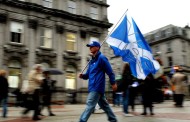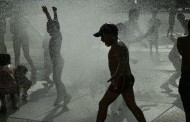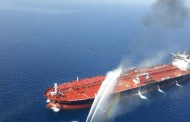peshmergas blunt, don’t break, islamic state siege of syria’s kobani

An Islamic State flag flies atop a building on the east side of the badly damaged Syrian town of Kobani during fighting between Islamic state forces and Kurdish fighters on November 6, 2014. CREDIT: REUTERS/YANNIS BEHRAKIS
(Reuters) – Iraqi Kurdish forces have blunted but not broken the siege of the Syrian border town of Kobani, a week after arriving to great fanfare with heavy weapons and fighters in a bid to save it from Islamic State.
Kobani has become a test of the U.S.-led coalition’s ability to halt the advance of the Sunni Muslim insurgents. The town is one of few areas in Syria where it can co-ordinate air strikes with operations by an effective ground force.
The arrival of the Iraqi Kurd peshmerga, or “those who face death,” with armored vehicles and artillery, has enabled them to shell Islamic State positions around Kobani and take back some villages.
But the front lines in the town itself are little changed, its eastern part still controlled by the insurgents, and the west still largely held by the main Syrian Kurdish armed group, the YPG, and allied fighters.
“There is no change at all in Kobani as a result of the peshmerga. Maybe one or two streets are gained then lost, back and forth,” said Rami Abdulrahman of the Britain-based Syrian Observatory for Human Rights, which monitors the war.
“ISIS (Islamic State) posts are well entrenched in Kobani city, and the Kurds say they need more heavy weaponry to make a dent … There also needs to be better co-ordination between the Kurdish units and coalition air forces,” he said, adding that Islamic State suicide attacks were also proving effective.
The peshmerga entered Kobani in more than a dozen trucks and jeeps last Friday from Turkey, cheering and making victory signs.
They were given a heroes’ welcome by Turkish Kurds and Syrian Kurdish refugees, angry at Turkey’s refusal to send in its own troops and optimistic, as they lined the streets cloaked in Kurdish flags, that the peshmerga would turn the tide.
The Kurdistan Regional Government, which runs a semi-autonomous region in northern Iraq, has made clear from the outset that its peshmerga fighters, numbering around 150, would not engage in direct combat in Kobani but rather provide artillery support to Syrian Kurds.
“Of course the presence of the peshmerga has been helpful because they’re shelling ISIS positions, destroying their fighters and weapons,” Idris Nassan, a local official in Kobani, said by telephone.
“Because of the peshmerga shelling we’ve stopped ISIS advances in the western rural areas as well as the east and southeastern front line of the city,” he told Reuters.
There was intense fighting in the days after their arrival, with heavy shelling and almost continuous gunfire as peshmerga forces and fighters from Syria’s moderate rebel ranks helped the YPG push the Islamists out of some surrounding villages.
On Friday, a coalition jet bombed a site southwest of the town. No gunfire or shelling could be heard across the border.
Nassan said that “constant shelling” by peshmerga forces had taken away some of Islamic State’s ability to attack and that there had been good co-ordination between the Kurdish units and the Free Syrian Army, the moderate rebel fighters.
A Reuters correspondent on the border said the intensity of the shelling had died down since then, and there had been no obvious change in the frontlines in the town itself.
“ISIS brings new fighters and supplies all the time, so we need new fighters and supplies too,” Nassan said, adding Islamic State fighters had seized nine tanks in an attack on the Sha’ar gas field in central Syria which they were bringing to Kobani.
The Sha’ar gas field, to the east of the city of Homs, has changed hands four times since July when Islamic State fighters first seized it. The Observatory said Syrian government forces retook it on Thursday.
Hevi Mustefa, the Kurdish leader of the Syrian province of Afrin, said Islamic fighters were amassing for an attack there, 200 km (125 miles) to the west of Kobani.
Afrin, which declared autonomy like Kobani and a third Kurdish-dominated region, Jazeera, now risks becoming “another Kobani,” Mustefa told Reuters during a visit to Ankara.
Despite having limited strategic significance, Kobani has become a powerful symbol in the battle against the hardline Sunni Muslim insurgents who have captured large expanses of Iraq and Syria and declared an Islamic “caliphate”.
The battle has raged in full view of the Turkish frontier, and Turkey’s reluctance to help defend the town sparked riots among Turkish Kurds last month in which 40 people died.
A lawmaker from Turkey’s pro-Kurdish Peoples’ Democratic Party accused soldiers of killing an activist as she and others crossed the border to show solidarity with Kurdish forces.
TV footage from Thursday showed soldiers firing tear gas at a large group of people running through a minefield and along a railway that divide Syria and Turkey.
“The person killed yesterday after Turkish soldiers opened fire was shot even though she already reached the Kobani side,” MP Levent Tuzel told reporters in Istanbul. His party has called on Turkey to re-open the crossing and let in aid and weapons.
A senior state official in the nearby town of Suruc said soldiers used tear gas but were not aware of any deaths or injuries from a shooting, CNN Turk reported. The military General Staff did not comment on the incident.
(Additional reporting by Alexander Dziadosz in Beirut, Ayla Jean Yackley in Istanbul and Jonny Hogg in Ankara; Writing by Nick Tattersall; Editing by Robin Pomeroy and Giles Elgood)



















